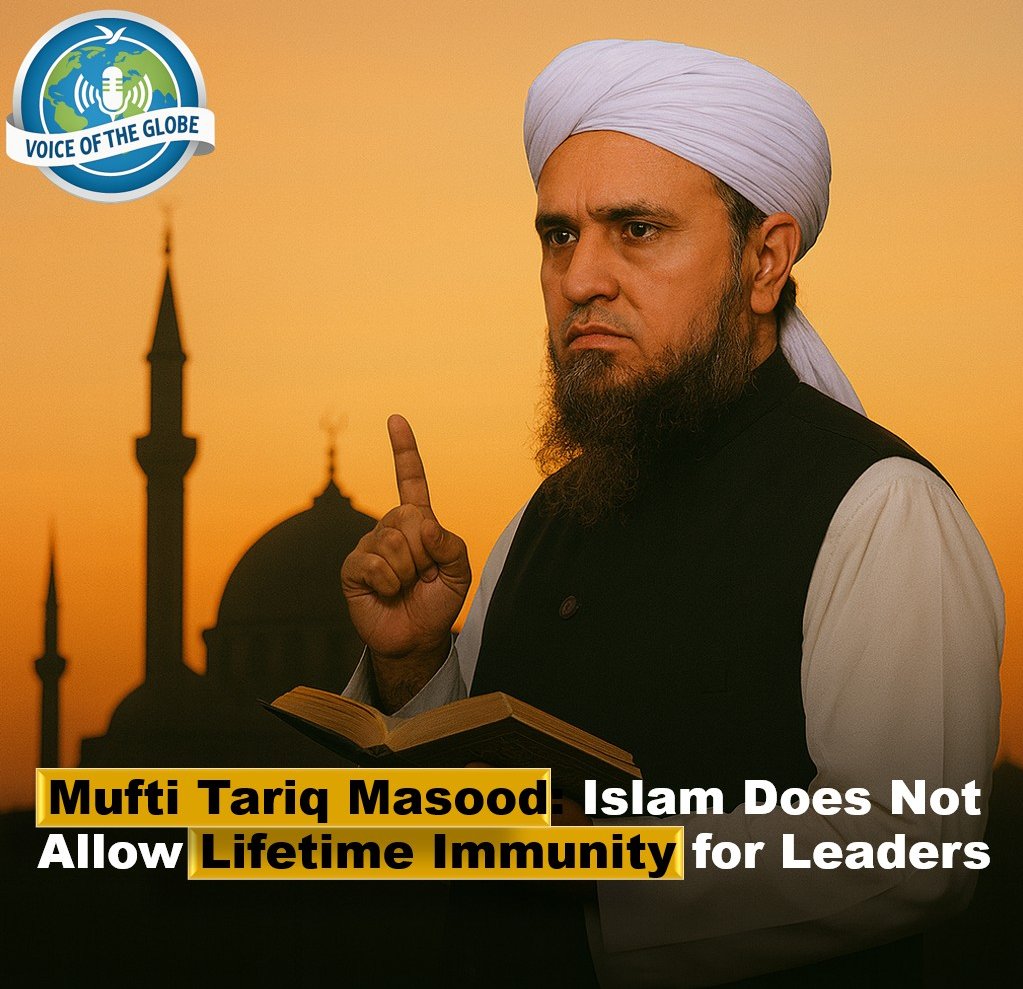Mufti Tariq Masood Says Islam Does Not Support “Lifetime Immunity” for Any Leader
Mufti Tariq Masood has clarified that the concept of granting “lifetime immunity” to any political leader or official has no basis in Islam. He explains that Islamic governance is built on justice and accountability, and no one can be placed beyond questioning or legal responsibility.
11/17/20252 min read


Karachi, Pakistan — Well-known Islamic scholar Mufti Tariq Masood has spoken out against the idea of giving political leaders or officials “lifetime immunity,” stating that such protection has no backing in Islamic teachings. His comments come at a time when discussions about accountability and leadership standards are taking center stage in public debate.
During a recent sermon, Mufti Tariq Masood stressed that no person—regardless of status or position—can be placed above justice. He reminded his audience that Islamic governance is based on responsibility, transparency, and fair treatment for all. According to him, permanently shielding any individual from legal or moral scrutiny contradicts the basic principles of the faith.
Islamic Perspective on Accountability
Mufti Tariq Masood highlighted that Islam teaches equality before God and the law. He explained that leaders in Islamic history were answerable for their actions and could not claim special privileges that harmed the community’s trust.
He further noted that:
Justice is a central element of Islamic governance.
Leaders must remain accountable to the people and to God.
A system that grants someone lifelong protection from questioning is against the spirit of Shariah.
While Islam does make exceptions for temporary immunity in specific, limited circumstances—such as protections granted to foreign envoys—there is no concept of permanent, unrestricted immunity for rulers or officials.
Why His Statement Is Drawing Attention
Mufti Tariq Masood did not refer to any specific government or individual, but his remarks have gained traction at a time when many Muslims around the world are demanding stronger checks on political power. His viewpoint adds a religious perspective to ongoing conversations about transparency, governance reforms, and constitutional changes in various countries.
Supporters say his message reinforces that justice and accountability are Islamic values, not political slogans.
Mufti Tariq Masood’s Key Point
In his address, the scholar emphasized that leadership in Islam is a responsibility, not a privilege. He warned that granting lifetime protection from legal consequences creates a gap between rulers and the people, encourages corruption, and goes against the ethical standards taught by the Prophet Muhammad (PBUH).
According to him, a leader should remain humble and answerable, not untouchable.
Impact on Public Opinion
Mufti Tariq Masood’s comments have sparked discussion among religious followers, political observers, and civil society groups. Many believe his stance strengthens the argument for building systems where every citizen—including those in power—can be held accountable for wrongdoing.
His message also serves as a reminder that faith-based principles of honesty, equality, and justice should guide public policy and governance.
Conclusion
Mufti Tariq Masood’s clarification offers a clear Islamic position: lifetime immunity for leaders has no place in the religion. His message supports the idea that societies thrive when justice prevails and when those in authority remain answerable for their actions.
As debates continue in Muslim countries about reforms and accountability, his voice adds significant moral and religious weight to the conversation.
Disclaimer: The opinions expressed by Mufti Tariq Masood are those of the scholar and are presented here for informational and journalistic purposes. This article does not constitute a fatwa or legal-ruling.
